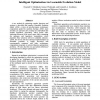Free Online Productivity Tools
i2Speak
i2Symbol
i2OCR
iTex2Img
iWeb2Print
iWeb2Shot
i2Type
iPdf2Split
iPdf2Merge
i2Bopomofo
i2Arabic
i2Style
i2Image
i2PDF
iLatex2Rtf
Sci2ools
107
click to vote
ICTAI
2006
IEEE
2006
IEEE
Intelligent Optimization via Learnable Evolution Model
A new method for optimizing complex functions and systems is described that employs Learnable Evolution Model (LEM), a form of non-Darwinian evolutionary computation guided by machine learning. LEM’s main novelties are operators for creating new individuals that include hypothesis generation, which learns rules indicating subareas in the search space likely containing the optimum, and hypothesis instantiation, which populates these subareas with new candidate solutions. LEM3, the newest and most advanced implementation of learnable evolution, is briefly described and experimentally compared with other evolutionary computation programs on selected function optimization problems. We also describe two specialized LEM-based systems for heat exchanger optimization.
Artificial Intelligence | Evolutionary Computation | ICTAI 2006 | Non-Darwinian Evolutionary Computation | Rules Indicating Subareas |
Related Content
| Added | 11 Jun 2010 |
| Updated | 11 Jun 2010 |
| Type | Conference |
| Year | 2006 |
| Where | ICTAI |
| Authors | Ryszard S. Michalski, Janusz Wojtusiak, Kenneth A. Kaufman |
Comments (0)

